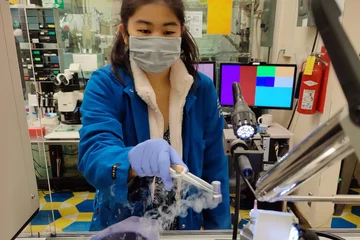What Is Tourette Syndrome?
Medical Expert Interview

Tourette Syndrome Causes, Symptoms, and Treatment
In this article:
- Tourette Syndrome Causes
- Tourette Syndrome Symptoms
- Tourettes vs Functional Tic Disorders
- Tourette Syndrome Treatment
- Tourette Syndrome FAQ
Meet Dr. John Piacentini
Dr. John Piacentini is a renowned clinical psychologist and researcher known for his expertise in the field of child and adolescent mental health.
Dr. Piacentini serves as the Director of the UCLA Child OCD, Anxiety, and Tic Disorders Clinic (as well as the Tourette Association Center of Excellence), and the UCLA Center for Child Anxiety Resilience, Education, and Support (CARES)—which is part of the UCLA Semel Institute for Neuroscience and Human Behavior. He is also a Professor of Psychiatry and Biobehavioral Sciences at the David Geffen School of Medicine at UCLA.

Throughout his career, Dr. Piacentini has focused on the study and treatment of obsessive-compulsive disorder (OCD) and related conditions in children and adolescents. He has conducted extensive research on the effectiveness of cognitive-behavioral therapy (CBT) and other evidence-based treatments for pediatric OCD and related disorders, including tic disorders and Tourette Syndrome (which is now officially called “Tourette Disorder” per the DSM-5).
Additionally, he has an impressive publication record, with over 300 scientific papers, chapters, and nine books to his credit. He also serves on the board of the Anxiety Depression Association of America and the International OCD Foundation while he co-chairs the Scientific Advisory Board for the Tourette Association of America.
(What Is a Psychologist? Click the link to learn more...)
What Causes Tourette Syndrome?
Is Tourettes Hereditary? Is Tourettes Genetic?
Yes, there is a lot of evidence suggesting there is a genetic component to Tourette Syndrome.
"Identical twins show about a 50% concordance for Tourette Syndrome," claims Dr. Piacentini. "If one identical twin has it, there's a 50% chance that the other twin will also have it. For fraternal twins, if one twin has it, there's about an 8-20% chance that the other twin will have it."
But it’s not just about human genetics. There are other contributing factors associated with Tourette Syndrome.
What Are the Most Common Causes of Tourettes?
According to Dr. Piacentini, biological causes—such as pregnancy and birth complications—have been linked to a higher incidence of tics and Tourettes.
Additionally, psychological stressors during early childhood development can also lead to an increased chance of developing Tourettes or a tic disorder.
"It's really multi-faceted and multi-determined. There are a number of genetic, biological, and environmental factors at play."
Are You Born with Tourettes? Can You Develop Tourettes Later in Life?
"What you're born with is a risk," explains Dr. Piacentini.
Some people, based on their family history, are more at risk than others, but because there are so many factors involved, it’s also possible for someone without any genetic precedence to develop the disorder.
But Tourettes very rarely presents past childhood: "To have Tourette Syndrome, we really need to see the onset in childhood."
However, it’s entirely possible to develop a different kind of tic, such as throat clearing, later in life. And it’s usually connected to a different kind of neurologic disorder or impairment.
"It can happen after trauma, like a head injury or surgery," says Dr. Piacentini. "Different kinds of medications, or even substance or alcohol use chronically over time, can also lead to the development of tics."

When Does Tourettes Develop?
According to Dr. Piacentini, the average onset age for tics is around 4 to 6 years old.
"And almost always, the initial tics we see in young kids are going to be motor tics, and they're going to be facial tics," he says.
Then the disorder typically progresses from the head down. So after the facial tics, you might start noticing head, shoulder, arm, or hand movements, then stomach tensing, and then leg or feet movements.
If it’s Tourette Syndrome, the vocal tics generally present last.
"Typically the vocal tics are going to present a few months after you first see the facial tics or the head tics, because that's just the way that Tourettes tends to work."
How Common Is Tourette Syndrome? How Many People Have Tourettes?
Tourette Syndrome is actually pretty rare: less than 1% of the population develops the disorder. According to Dr. Piacentini, studies show only about 0.6%-0.8% of people have Tourette Syndrome.
However, persistent tic disorders (tics that have been present for a year or longer) affect 2-3% of the population.
And anywhere from 20-25% of kids between the ages of four and seven can have provisional tics (tics that have been present for less than a year).
"If you go into a classroom, you're probably going to see a couple of kids with tics. But in the vast majority of those kids, the tics will disappear after a few weeks or a few months."
What Are the Symptoms of Tourette Syndrome?
What Are Tics?
Tics are sudden, rapid, recurrent, non-rhythmic motor movements or vocalizations. Or as Dr. Piacentini puts it: "Tics are just little behaviors that the brain has a hard time stopping. Blinks and sounds and things that can occur in anybody at any time."
Types of Tics: Motor Tics vs Vocal Tics
Motor tics are involuntary movements or gestures. These movements can vary in intensity, duration, complexity, and location in the body. Motor tics can involve simple or complex actions such as eye blinking, facial grimacing, head jerking, shoulder shrugging, or limb movements. They can be brief or more prolonged and may change in pattern over time.
Vocal tics—also known as phonic or vocalization tics—are involuntary sounds or vocalizations. These tics can manifest as simple or complex sounds, ranging from throat clearing, coughing, grunting, sniffing, or humming to more elaborate utterances such as words, phrases, or even the repetition of other people's words (known as echolalia). Complex vocal tics may involve the production of socially inappropriate or offensive language (known as coprolalia), although this is relatively rare, only occurring in about 10-15% of cases.
How Is Tourettes Diagnosed? What Is a Tic Disorder?
"The definition of Tourette Syndrome is actually quite simple," explains Dr. Piacentini. "It is characterized by the presence of multiple motor tics and at least one vocal tic for a minimum of one year or longer."
However, it’s important not to confuse or conflate Tourette Syndrome with a persistent tic disorder: "Also known as chronic motor tic disorder, it features motor tics only, no vocal tics, no sniffing, no coughing, or anything like that. And that's pretty common. Persistent vocal tic disorder—that is vocal tics only with no history of motor tics—is much less common."
And then there’s provisional tic disorder, which applies to somebody who has tics—of any kind—that have been present for less than a year. "It's called provisional because only about 10% of kids with provisional tic disorder go on to develop more persistent tics or Tourette Syndrome," says Dr. Piacentini. "However, they don't get that diagnosis until they've actually had the tics for a year."
Help Shape the Future of Mental Health by Joining the UCLA Mental Health Research Registry
Functional Tic Disorders vs Tourettes: What’s the Difference?
A functional tic disorder is primarily associated with psychological factors, while a persistent tic disorder is considered a neurodevelopmental condition. It’s easy to get them confused—and some people can have both functional tics and Tourettes at the same time—but there are some key differences to note.
First and foremost, the age of onset is quite different: "The typical onset for these functional tic-like behaviors are in adolescence or young adulthood… and that just doesn't match," claims Dr. Piacentini. "To have Tourette Syndrome or a tic disorder, we really need to see the onset in childhood."
The progression of the tics is also much more dramatic in a functional tic disorder. Instead of starting with small motor tics in the face or head, the disorder will present with large movements and loud, disruptive vocal tics: "They tend to start with cursing, shouting, screaming, and big movements, like hitting themselves, hitting others, arm thrusting or leg kicking," says Dr. Piacentini. "It's a completely different developmental progression of the tics. So that's one of the ways that we differentiate."
Finally, the presence of comorbid conditions is unique to each disorder. Tourettes and traditional tic disorders are most often associated with disorders like ADHD and OCD. On the other hand, functional tic disorders are more frequently linked with emotional conditions, like depression and anxiety.

The Role of Social Media and the Pandemic
What does the Covid-19 pandemic and social media have to do with the development of functional tics? Dr. Piacentini believes enforced isolation coupled with the presentation of different tic symptoms by some social media influencers created the perfect storm for the development of functional tic-like behaviors in some youth.
"During the pandemic, everyone was really isolated, and the primary way to connect was by going on social media, which is full of mental health related content, including a lot of younger people who are talking about their own mental health struggles or their own mental health symptoms. While connecting with others in this manner can be helpful in some cases, it appears that some young people seeing severe tic-like behaviors started exhibiting some of these symptoms on their own."
Dr. Piacentini is quick to point out that modeling behaviors seen in others is a very human thing to do since mimicry and empathy are important ways of both learning new behaviors and connecting with others.
"The individuals who developed these behaviors weren’t doing so maliciously, or because they wanted attention. It’s just that's the way our brains work. It’s a way of trying to achieve some kind of social connection when we're isolated."
Dr. Piacentini also said that it was important to acknowledge that not all function tic-like behaviors come from viewing social media, but that there are a number of different reason for why these symptoms may emerge.
What Is the Treatment for Tourette Syndrome?
Can Tourettes Go Away? Does Tourettes Go Away?
Fortunately, a significant number of children diagnosed with Tourettes won’t have to deal with the disorder in adulthood: "After puberty, for about a third of kids, the tics may gradually disappear on their own. And by the end of adolescence, for another third of kids, the tics may also disappear or significantly diminish."
The exact reason why tics resolve over time for some is not well understood, but may tie back to the fact that these are neurodevelopmental disorders. And the key words there are "neuro" and "developmental" because as we grow and mature from children into adults, our brains learn new pathways and patterns of behavior.
Or as Dr. Piacentini puts it: "As our brains develop, we may simply get better at learning how to inhibit unwanted behaviors. Although the urge to tic may still be present, some people become better able to hide or camouflage their tics or resist ticcing altogether."
Can Tourettes Be Cured?
Cured may not be the right word, but Tourette Syndrome can certainly be managed and, in some cases, become nearly nonexistent with the right approach to treatment.
Tourette Syndrome Medication
According to Dr. Piacentini, medication was—for many years—the primary way physicians treated Tourettes. Patients were given antipsychotics (such as haloperidol or risperidone) and later alpha2 agonists (such as guanfacine and clonidine).
"Historically, it was just medication. That was the only helpful treatment for tics for decades."
While there were some behavioral treatments developed in the early 70s, they were rarely used because the prevailing professional opinion was that suppressing tics could (and likely would) lead to other problems. However, this opinion was incorrect.
How to Calm Tics Naturally Via Behavioral Treatment
Things changed about 20 years ago when Dr. Piacentini and some colleagues started re-examining the potential for behavioral therapy and treatment. The Tourette Association of America convened a consortium, where Dr. Piacentini and other specialists developed a new approach to treatment called CBIT or the Comprehensive Behavioral Intervention for Tics.
"We developed this treatment and we tested it in two large NIMH-funded studies—one for children and adolescents, and one for adults—and we demonstrated that it works actually quite well. In fact it works about as well as medication but without the side effects," he declares. "So over the last 20 years, there's been a real paradigm shift where specific behavioral treatment has actually become the first-line recommended treatment for Tourettes."

How Does the CBIT Treatment for Tourettes Work?
CBIT combines several behavioral techniques to help individuals manage and reduce the frequency and intensity of their tics. The primary components of CBIT include habit reversal training and functional analysis.
Habit reversal training involves first increasing awareness of the urges or sensations that lead to tics. By becoming more aware of these sensations, individuals can better anticipate the tic, which gives them time to practice alternative, incompatible movements or actions that can temporarily suppress or replace the tic. These competing responses are purposefully designed to be physically incompatible with the tic. For example, if a person has a shoulder tic, they might learn to perform a specific shoulder muscle tightening or stretching exercise as a competing response to interrupt the tic.
"It's hard because the urge is knocking on their brain and saying, Man, move your arm, move your arm. This sucks. Move your arm! But patients can learn over time that ultimately the urge will dissipate as long as they're not giving in to it."
Functional analysis increases awareness, understanding and context of the tics. The individual and those around them learn to recognize situations or places that increase the likelihood of ticcing. By becoming more aware, individuals can better anticipate and respond to their triggers.
And what makes a person tic, so to speak? "It might be attention. It might be stress. It might be called on in class. It varies from person to person."
In addition to triggers or antecedents, it’s important to identify both the positive and negative consequences of the tics:
"The number one consequence, of course, is that the urge goes away. But oftentimes kids also get positive attention, they get comfort, they get to escape from activities they don't want to do. And these are completely normal reactions," Dr. Piacentini says reassuringly. "But they also can reward the tic."
Negative consequences are also important to pinpoint: "They get negative attention. They get teased. They're told to stop ticcing. And that makes patients more self conscious and more upset, and then, of course, they tic more."
So the behavioral treatment is scrubbing the environment of triggers and reactions that may lead to more tics and then teaching how to manage the premonitory urge that usually leads to ticcing.
"I call it the inside outside game. The inside game is the urge and trying to manage the urge without ticcing. And the outside game is trying to clean the environment of everything that might make tics more likely to happen."
Common Misconceptions About Tourette Syndrome
Is Tourettes Real?
Absolutely. "It’s a real medical condition," insists Dr. Piacentini. "From a psychiatric perspective, it's considered a neurodevelopmental disorder along with ADHD and learning disorders. From a neurological perspective, it's considered a motor disorder."
(What Is a Neurologist? Click the link to learn more...)
Is Tourettes a Mental Illness?
"Technically it’s a mental illness because it’s identified by the DSM (the Diagnostic and Statistical Manual of Mental Disorders). However, unlike many psychiatric disorders—such as depression, anxiety, or schizophrenia—it's not really a disorder of cognition or emotion," clarifies Dr. Piacentini.
To sum it up: "Tourettes is listed as both a psychiatric and neurologic diagnosis. It’s a disorder of inhibition. It's an inability to control movement and sound."
Is Tourettes a Disability?
"According to the Federal Department of Justice, Tourette Syndrome is legally recognized as a disability and those who live with TS are afforded every legal protection that they are entitled to under law, including the Americans with Disabilities Act," said Dr. Piacentini. "It's also important to know a significant number of individuals with Tourettes are highly functional. Some of the most famous people in history—athletes, musicians, writers, and politicians—have had Tourettes."
"However, it can be disabling for some patients," he admits. "And they might require some accommodations, just as a person with depression or anxiety or ADHD might find their symptoms require accommodations. For example, many schools will work with individuals and their families to implement an IEP or 504 plan."
Why Do People With Tourettes Swear?
Actually, most people with Tourettes don’t swear… The presence of coprolalia—the involuntary utterance or vocalization of socially inappropriate or offensive words, phrases, or obscenities—is seen in only about 10-15% of patients with tics.
This is a common misconception, due mostly to the way Tourettes has been portrayed by the media, something Dr. Piacentini finds somewhat frustrating.
"When people think of Tourettes, they often think of a whole host of associated behaviors like anger issues (such as shouting profanity, rage outbursts, or explosive temper) as well as obsessive thoughts, compulsive behaviors (such as hair pulling), anxiety, depression or even learning disorders. Because that’s what they see on TV."
"It’s really important to realize that if somebody has a diagnosis of Tourette Syndrome, all it means is they’ve had motor tics and a vocal tic longer than a year," he insists. "Yes, in some cases, we see these other symptoms that are associated with Tourettes and other tic disorders. But they are not defining characteristics. That's a critical point."
Can You Have Tics Without Tourette’s?
Yes, absolutely. "Tics are common," Dr. Piacentini explains. "All Tourettes means is that the person has motor tics lasting one year or longer along with at least one vocal tic, with tics starting prior to age 18. Tics can also occur as part of both provisional tic disorders (tics present less than one year) and persistent motor or vocal tic disorders."
In fact, a person is far more likely to have a tic or tic disorder than Tourette Syndrome.
Tourette Syndrome Awareness Month
Tourette Syndrome Awareness Month is observed in the United States from May 15 to June 15. It is a designated time to raise awareness about Tourette Syndrome, educate the public, and provide support for individuals with the condition and their families. Throughout the month, various organizations, advocacy groups, and individuals conduct events, campaigns, and initiatives to promote understanding, reduce stigma, and increase knowledge about Tourette Syndrome. These efforts aim to improve the lives of those affected by the condition and facilitate acceptance and support within communities.

In honor of Tourette Syndrome Awareness Month, Dr. Piacentini has three things he’d like the world to know about this disorder.
#1 - People with Tourettes cannot help when they're ticcing. "One of the worst things that happens for kids with tics is that they're blamed for when they tic, and oftentimes the tics are considered intentional. So, we've had individuals with Tourettes being arrested, beaten up, thrown out of school, cancelled by their groups and so forth because people interpret their behavior as volitional."
#2 - Ignore the tics. "The more attention we give the tics, the stronger they get. Treat the individual as an individual, not a disabled individual or an individual with tics."
#3 - Be sensitive. "Oftentimes they’re able to manage the symptoms. But in some situations, it can be difficult, and they can't. And the more anxious or self-conscious somebody with Tourettes feels, the more likely they are to say something that might get them in trouble"



